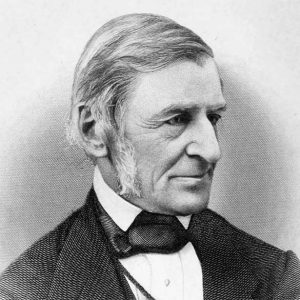Author: Carolina Maciel
The exploitation of the human being in relation to its creations is considered as a widely spread concern proposed by the Transcendentalists. It was aphoristically disclosed by Thoreau in his 1854 book Walden, where he wrote that “Men have become tools of their tools” (37). Additionally, two of Emerson’s somewhat less popular essays, “Circles” (1841) and “Works and Days” (1870), also offer possibilities to acquaint ourselves with his views on technological innovation and their influence on society. The rise of artificial intelligence quite often calls for speculation about the future; however, it can also inspire considerations about the past in order to offer a broader picture of human achievements while suggesting more awareness and calls to action regarding AI.
Although both Emerson and Thoreau had their own levels of awareness of the possible impending consequences of industrialization in their time, both men were interested in technology in ways that fit them. Thoreau himself was drawn to the improvement of daily life artifacts, from journal musings on a more ergonomic prototype of shoe to surpass the narrowness of contemporary models, to his development of a grinding mill for graphite and its concoction with certain kinds of clay in order to create his famously awarded top tier pencils sold at his family business. Of steam, Emerson wrote in his essay “Fate” (1860) that it “was till the other day the devil which we dreaded” (959), referring to the human pursuit of harnessing its power rather than dreading it. The optimism toward technology captured in some of these biographical anecdotes and excerpts might sound anachronistic to our 21st-century ears, if we consider that they were not able to grasp the scope of unfolding political, social and environmental consequences attributed to the influx of technological advancement since the late 19th century to our current days.
In “Circles,” Emerson’s views could be understood as providing a hint that, while AI can possibly mean hardly anything but an example of the natural and everlasting transposition of the circles of thought in which the human mind dwells while it creates innovation and shares the result of the process with other individuals, it can also foster stagnation if perceived as an end in itself, that is, to perceive a certain product of thought, no matter how innovative, such as any new technological resource as a final frontier and not as merely an added chapter in humanity’s quest for understanding and optimization of activities and systems. The consideration of a possible exceptionality of our current century, due to AI or anything that is yet to be revealed seems to be much less fruitful than discussing and caring about the social implications attached to it.
The notion that AI has started to progressively hinder our social relationships and opportunities for fair employment and externalized creativity, if considered as a symptom of skepticism toward technological improvement can find echoes through Emerson’s realization, in “Works and Days,” that times have always been difficult and embedded with scarcity, chaos and loss. He nods to the idea that it is our inherently human agency that can keep us from being instrumentalized by our inventions, and that innovation does not appear as a panacea at all, but rather, demands a deep sense of responsibility.
Because it is the result of human initiative, AI inherits the vices and flaws of its ancestors: its harmful potential cannot be undermined. Institutions carry specific sets of values and purposes that are passed down to whatever technological outlet, which ironically contradicts the very premise of innovation. We can already count fairly established examples through the already currently researched problem of gender and race bias in AI and how it misrepresents the complexity of human beings.
On an individual level, one can publicly criticize AI or simply not subscribe to its tools despite their supposed convenience, but understanding its outreach means acknowledging the fact that it will be permeating our lives without our consent as well. Acts of civil disobedience might spring out of that, especially if individuals break free from the shame and stigma of receiving the derisively inaccurate label of Luddites and claim the act of questioning technology, and more specifically, AI, leaving space for deliberate choices of engagement.
Perhaps, the early era of AI and its yet to be unveiled next steps are, indeed, awful. More than just uncomfortable, hard to consort or capable of stirring away yearnings for stability and simplicity, they might be awful also in the archaic sense of the word, which can give them a soberly empowering twist: they are also deserving of awe—for they demanded intricate intellectual efforts to be achieved—deep respect and concern—for they have been inserted in crucial aspects of life such as work, education and healthcare—and a carefully guarded fear, which may guide humanity into questioning how it is being handled and therefore organizing collective action when it threatens the well being and the existence of fellow sentient beings and the Earth as a whole. Exploring the rise of AI isn’t a challenge strictly confined to the realm of the future, but rather, also an inevitable call to examine the past, the achievements and perceptions of our forebears.
Works Cited
Emerson, Ralph Waldo. Essays and Lectures. Edited by Joel Porte. The Library of America, 1983. Thoreau, Henry David. Walden. Edited by J. Lyndon Shanley. Princeton University Press, 2016.
